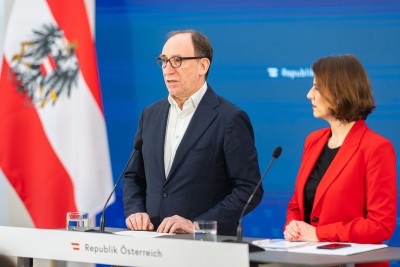Austria’s Plan for Gradually Dropping COVID Mitigations
June 30 is going to be the date when all COVID-19 Measures Will Drop in Austria. Health Minister Johannes Rauch and Constitution Minister Karoline Edtstadler confirmed this in a press conference.
 Health Minister Johannes Rauch (l) and Constitutional Minister Karoline Edtstadler (r) Presented the Plan to Gradually End the COVID-19 Measures in Austria. / Picture: © Bundeskanzleramt (BKA) / Florian Schrötter
Health Minister Johannes Rauch (l) and Constitutional Minister Karoline Edtstadler (r) Presented the Plan to Gradually End the COVID-19 Measures in Austria. / Picture: © Bundeskanzleramt (BKA) / Florian Schrötter
Constitutional Minister Karoline Edtstadler and Health Minister Johannes Rauch presented the timetable for the end of the COVID measures in Austria today in the press foyer after the Council of Ministers in Parliament. The specific rules that were issued in the course of the pandemic are to be phased out gradually by the summer. For example, the mask requirement, which currently still applies to vulnerable areas such as hospitals and nursing homes, is to be lifted on April 30. This also applies to the risk group exemption. The special provisions for SARS-CoV-2 as a notifiable disease should then end on June 30 and there will then no longer be any traffic restrictions for infected people. A transition to the regular operation of the Austrian healthcare system is to take place.
According to ORF, the Covid Measures Act authorized the Minister of Health to impose movement restrictions on the population. The sometimes stricter state measures were only possible based on this law. With the abolition at the end of June, the City of Vienna, for example, is no longer authorized to issue special rules. All regulations such as the obligation to wear masks and tests, therefore, end everywhere on June 30.
Also according to ORF, to transfer vaccinations, tests, and the dispensing of Covid-19 medication into the regular structures of the health system, talks with the federal states and social security are necessary. Medicines are paid for by health insurance. In the case of vaccinations, the costs should be shared between the federal government, the federal states, and health insurance companies. The aim is for vaccination and medication to remain free. The tests should also be available free of charge for people with symptoms as before. At the same time, the Ministry of Health is working on a fundamental revision of the Epidemic Act. Rauch wants to involve all affected interest groups, which is to take place before the end of this year. The aim is to send a draft law for a new epidemic law for review in this legislative period. A “pandemic plan” should be available this year. This is intended to show how to deal with the different phases of a pandemic. The goal, said Rauch, was to abandon the modus operandi of pushing through new laws, which was necessary at the time.
Constitutional Minister Karoline Edtstadler drew a balance at the expiring special regulations and crisis measures: "Especially at the beginning of the pandemic, it became apparent that there was parliamentary cooperation, cooperation across party and national borders, which unfortunately has changed over time." The COVID pandemic has also shown "that balancing fundamental rights is necessary, but can mean painful interventions," said the constitutional minister, referring to the need to weigh up the maintenance of a functioning health system and personal freedoms. She is convinced that "politics acted to the best of their knowledge and belief at all times and always had the well-being of the society in mind".
In the end, the Constitutional Minister was pleased that "the end of the pandemic is here" and that the international comparison also shows that the crisis measures are now being phased out everywhere. "I hope that today we can close a chapter that has brought us to social limits in many areas." Nevertheless, the crisis also brought with it many new experiences, such as in the area of digitization. Such positive developments, such as the digital hearing in administrative court proceedings, can and should therefore be continued and corresponding special provisions incorporated into permanent law. "Finally, I would like to thank everyone who helped us get through this crisis so well." This applies in particular to health workers, and science, but also to the general public. Together we managed to pass this "hard test for society and democracy".



